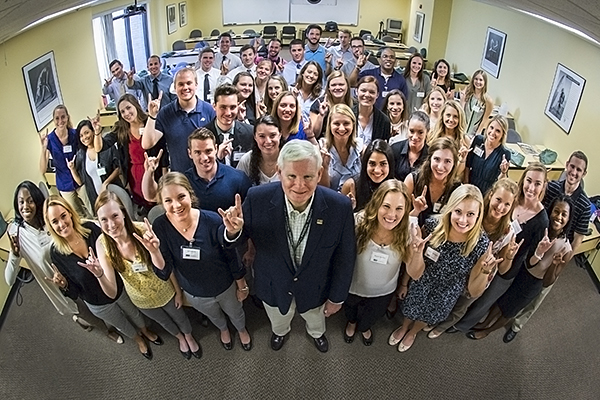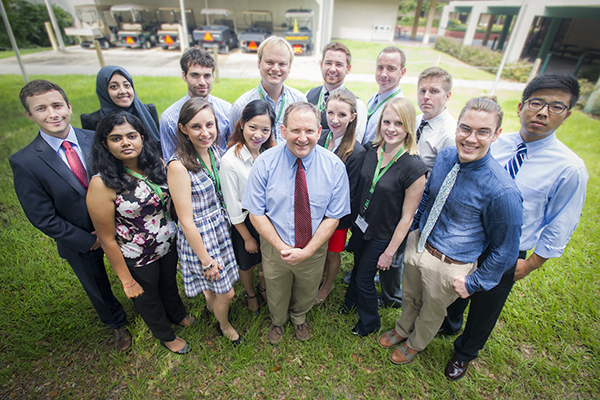USF Health welcomed more than 1,400 incoming students to its colleges and programs, a total that reflects record-setting up-tics in several areas. As these new students get their bearings on their first day, here’s a glimpse of their Class stats.
College of Public Health
The USF College of Public Health welcomed more new graduate students this year than last year, and its largest incoming class for its DrPH program in its history.
| Fall 2016 | ||||
| Undergraduate | ||||
| Program | Total | Women | Men | Internat’l |
| BS | 122 | 90 | 32 | 9 |
| Graduate | ||||
| Program | Total | Women | Men | Internat’l |
| PhD | 10 | 10 | 0 | 4 |
| DrPH | 20 | 13 | 7 | 1 |
| MHA | 6 | 4 | 2 | 0 |
| MPH | 188 | 139 | 49 | 21 |
| MSPH | 9 | 6 | 3 | 0 |
| Totals | 233 | 172 | 61 | 26 |

The COPH lobby is filled with new faces as classes for Fall 2016 begins. Photo by Natalie Preston-Washington.
College of Pharmacy
As the USF College of Pharmacy welcomed it sixth group of freshman in its short history, its reputation among applicants is growing strong. The College maintained its number of applications this year, while the national trend has seen a decrease in applications to the PharmD programs. In addition, students applying to the USF College of Pharmacy are a more robust pool of applicants, with average PCAT scores and GPAs have increased for this incoming class. Topping of this College’s firsts is the fact that, for the first time, more females were admitted than males; previous years were evenly split.
Total new students: 97 students
Age: Average age is 23, age range is 20 to 44
Gender: 70% Women 30% Men

Dean Kevin Sneed gives a Go Bulls! with the new students in Pharmacy’s Class of 2020. Photo by Katy Hennig.
Morsani College of Medicine
MD Program
The Class of 2020 for MCOM’s MD program is the largest class in the school’s history and the strongest group academically to enter the college, averaging a record 34 on the MCAT (Medical College Admission Test) exam, the highest of all Florida public universities and a score that places MCOM above the 90th percentile for all students taking the exam nationwide. In addition, this group represents the 183 students who were culled from more than 6,100 applications and successfully admitted to MCOM, also a record number.
Total new students: 183
Gender: 45% Women 55% Men

The MCOM MD Program Class of 2020 had its reception at the Tampa Museum of Art. Photo by Eric Younghans.
Biomedical Sciences Graduate and Postdoctoral Programs
In total, there are 377 new students to the Biomedical Sciences Graduate and Postdoctoral Programs who were chosen among 1,433 interested applications.
MCOM PhD Program
The PhD program welcomed 16 new students this fall, five of whom are international.
Gender: 50% Women 50% Men
16 PhD students include: Mariana Burgos Angulo, Cory Diemler, Andie Dodge (not pictured), Eric Haas, Alexandra Jenkins, Nicholas Johnson, Michael Kemp, Roukiah Khalil, Andrew McGill, Zeinab Motawe (not pictured), Austin Nenninger, Courtney Penn, Michael Sacco, Meena Subhashini Subbarayan, Jianxiang Xue,and Jiajia Yang.
MCOM Master’s Program
The MCOM Master’s in Medical Sciences program offers two tracks: a research track for those who want to pursue a career in research or enter into a biomedical sciences PhD program, and a pre-professional track for those seeking admission in a health professional school.
This year, there are 361 incoming master’s students.
In the pre-professional track, there are 209 new students, the largest group in the program’s history. Their average GPA was 3.35 and their average MCAT score was a 27 on the old scale and 501 on the new scale.
In the research track, there are 152 new students. Their average GPA was 3.29 and their average MCAT was a 23 (old scale) and 495 (new scale).

Dr. Michael Barber greets incoming Master’s student Juanita Patterson-Price to the Pre-Professional Master’s Program. Photo by Eric Younghans.
School of Physical Therapy and Rehabilitation Sciences
The School of Physical Therapy and Rehabilitation Sciences welcomed its Class of 2019 to its Doctor of Physical Therapy program, a group chosen from among a record number 1,493 applicants for 48 positions. With a 3% chance of getting in to the USF DPT program, this group is the School’s most selective class ever. This group also beats national averages for GPA for those entering into DPT programs.
Total new students: 48
Gender: 66.7% Women 33.3% Men
Average Overall GPA: 3.70 (national avg. is 3.5)

Dean Sandy Quillen greets new DPT students at the School of Physical Therapy Orientation. Photo by Eric Younghans.
College of Nursing
The College of Nursing is having a strong start: This new academic year, the nursing school had more than 1,400 undergraduate applicants, with about 600 of those applying for the upper division sequence, the highest number in years. This semester, the College of Nursing also admitted the highest number of CRNA students since the program opened in 2006, admitting a total of 50 applicants. In addition, the College has seen an increase in graduate degree admissions, totaling 250 graduate students – with 60 of those pursuing doctoral degrees.
| FALL 2016 | ||||
| Undergraduate | ||||
| Program | Total | Men | Women | Avg GPA |
| Upper Division BSN | 52 | 10 | 42 | 3.82 |
| Second Degree BSN | 32 | 3 | 29 | 3.6 |
| Veteran’s to Bachelor’s | 24 | 12 | 12 | 3.52 |
| RN-BS | 137 | 18 | 119 | 3.22 |
| Totals | 245 | 43 | 202 | 3.54 |
| Graduate | ||||
| Program | Total | Men | Women | |
| BS-DNP | 47 | 3 | 44 | |
| MS-DNP | 13 | 6 | 7 | |
| MSNA (CRNA) | 50 | 21 | 29 | |
| BS-PhD | 1 | 0 | 1 | |
| MS-PhD | 1 | 0 | 1 | |
| Totals | 112 | 30 | 82 |
More photos from the College of Nursing orientations: Graduate program, CRNA Program, RN to BSN Program, and Pre-licensure, Upper Division, Second Degree and VCARE.


